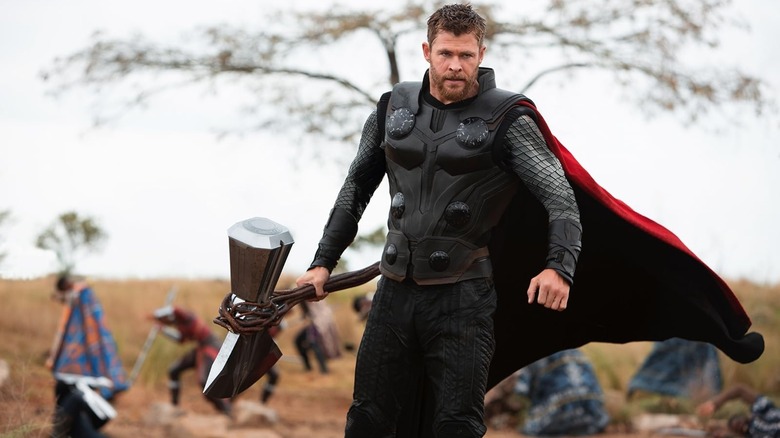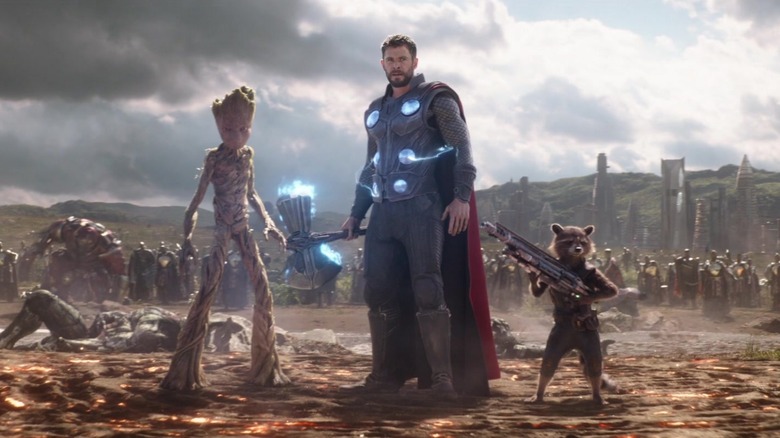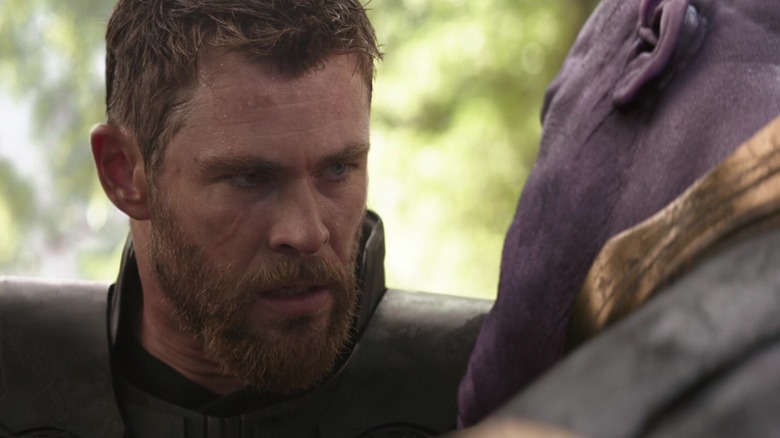The Thor Mistake Most Marvel Fans Completely Missed In Avengers: Infinity War
We may receive a commission on purchases made from links.
This may be an unpopular opinion, but Thor (Chris Hemsworth) is one of the less interesting characters to emerge from the Marvel Cinematic Universe. (Readers, please feel free to skip ahead to the end of this slide if you're not in the mood for an anti-Thor tirade.) On paper, he's interesting — in that he is a superpowered Norse deity, yet he is beholden to the rules of honor and propriety practiced by the Asgardian aristocracy. He was built for battle, but he also must possess honor in order to wield his best-known weapon: a massive, lightning-powered hammer. The problem with Thor is that his powers, and indeed his character, are ill-defined. Although he is a literal Norse deity, several MCU films redefine him as a space alien (!) who merely imitates a god. He must "be worthy" to use his hammer, but it's never been defined what worthiness entails.
Also, for a god, his powers seem incredibly limited. One would think that if a deity brought an enchanted hammer down onto Captain America's shield, both the shield and Captain American would be instantly reduced to charred salsa. Instead, the shield bonks it away. Thor is the god of thunder, yet hurling lightning bolts doesn't seem to do much to his foes. Also, his character mutates dramatically from film to film. In Kenneth Branagh's 2011 film "Thor," he is a character-free lager lout, sent to Earth to regain his honor and fight an empty suit of living armor. By Taika Waititi's "Thor: Ragnarok" in 2017, however, he has been transformed into a clueless buffoon, more of a comedic sidekick than a noble deity. (For the record, Thor is far more effective as the latter.)
The above-listed issues are mere character issues. Thor's inconsistent age, however, is a legitimate continuity error. In the 2023 book "Marvel Studios' The Marvel Cinematic Universe: An Official Timeline" by Anthony Breznican, Amy Ratcliffe, and Rebecca Theodore-Vachon, Marvel Studios even admitted it fouled up how old Thor really is.
How old is Thor?
In Anthony and Joe Russo's 2018 film "Avengers: Infinity War," several dozen MCU superhero characters unite to fight a giant evil purple alien named Thanos (Josh Brolin) who seeks a collection of six magical gems that, when united, will allow him to do pretty much anything. Thanos is concerned with the diminished quality of life in an overpopulated universe and figures it would be easiest to magically erase half of the universe's population in an instant. Fewer people means more food for the survivors.
Thor attempts to stop Thanos, but first he requires a new weapon after his magical hammer was destroyed in "Ragnarok." He thusly teams up with the space-faring pseudo-cops the Guardians of the Galaxy, trading barbs with a hyper-intelligent raccoon named Rocket (Bradley Cooper), on the way to making a new weapon in a mystical galactic forge. In one of his conversations with Rocket, Thor admits that he is 1500 years old, meaning he was born in the year A.D. 518, the same year that Justin I founded the Justinian Dynasty in the Byzantine Empire.
In the first "Thor," however, there is a flashback to Thor's childhood wherein Odin recounts his presence at the Battle of Tønsberg, which took place many years before ... in A.D. 965, at which point Thor would have already been 447. How old was he, then, when Odin told him the story of Tønsberg?
In "Official Timeline," the authors cover up Thor's bizarre aging pattern with a clever inside joke involving the Time Variance Authority. The TVA, seen in the TV series "Loki" and the film 'Deadpool & Wolverine," oversees the Marvel multiverse's various timelines. Its mascot, Miss Minutes, offers the following information in the book:
"Why, hello! Thor says he's 1500 years old, but wasn't he just a baby around 696 CE? I'd have an answer for y'all now, but Casey just spilled coffee all over the mainframe, bless his heart."
Curse you, Casey.
Maybe Thor just ages weirdly
Casey, incidentally, is a "Loki" character played by Eugene Cordero. He's an ordinary guy who works for the TVA and, it seems, is very clumsy with his coffee. So, there is an explanation for how Thor was still a baby in A.D. 696, even though he was born in 518, and it seems to involve time travel or some kind of parallel universe shenanigans. However, it also appears that information was accidentally erased by an errant spill. C'est la vie. Nice save, Marvel.
Of course, all the inconsistencies could alternatively be explained in a simple way: Thor, a nonhuman entity, merely ages weirdly.
It's possible that gods/Asgardians remain infants for a few centuries before entering a cocoon and pupating into a child. Then they remain children for a spell, explaining why Thor was still a kid about 450 years later. Then they pupate again and become adults and remain that way for time immemorial.
Thanks to Chloé Zhao's 2021 film "Eternals," audiences know that ineffable space deities in the MCU engage in strange reproductive practices. In that film, it's revealed that Earth was created by a cosmic entity called a Celestial to serve as an egg for a baby Celestial. The egg won't hatch, however, until the human population reaches a certain level and the embryo can feed on the right volume of psychic energy. The Celestial hatches out, killing all life on the surface. This is seen as an acceptable sacrifice, as Celestials spend their billion-year lives to create hundreds of thousands of other worlds.
If alien space gods can hatch out of Earth, then Asgardians can age in fits. Indeed, this makes more sense than some of Thor's superpowers.


